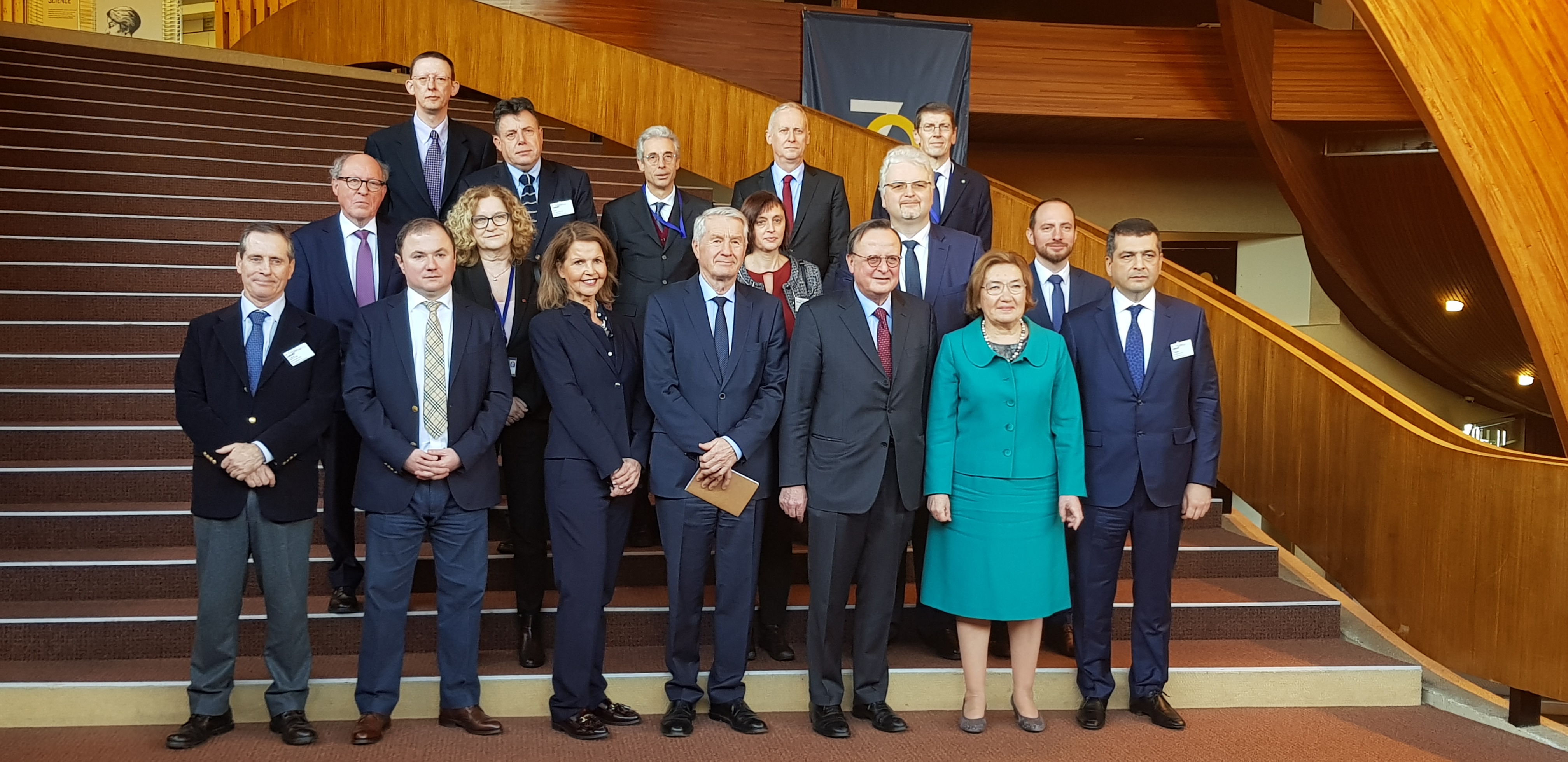
by Herdís Þorgeirsdóttir | 4.02.2019 | Almanak
Forsvarsmenn helstu stofnana Evrópuráðs sátu fund með framkvæmdastjóra Evrópuráðsins í höfuðstöðvum þess í Strassborg hinn 4. febrúar þar sem farið var yfir stöðu mála. Herdís Kjerulf Þorgeirsdóttir sat fundinn af hálfu Feneyjanefndar sem fyrsti varaforseti nefndarinnar en Feneyjanefnd er ráðgefandi aðili fyrir öll 47 aðildarríki Evrópuráðsins auk 14 annarra ríkja.

by Herdís Þorgeirsdóttir | 9.12.2018 | Almanak
 Rakst á Jeremy Corbyn leiðtoga breska Verkamannaflokksins í Mexíkóborg. Hann var við innsetningu nýs forseta landsins þar sem hann var sérstakur heiðursgestur. Nýi forsetinn, Andres Manuel Lopez Obrador er vinstri maður og populisti sem hefur heitið þjóðinni því að ráða niðurlögum mikillar spillingar í Mexíkó; draga úr vaxandi ójöfnuði og fátækt sem er mikil.
Rakst á Jeremy Corbyn leiðtoga breska Verkamannaflokksins í Mexíkóborg. Hann var við innsetningu nýs forseta landsins þar sem hann var sérstakur heiðursgestur. Nýi forsetinn, Andres Manuel Lopez Obrador er vinstri maður og populisti sem hefur heitið þjóðinni því að ráða niðurlögum mikillar spillingar í Mexíkó; draga úr vaxandi ójöfnuði og fátækt sem er mikil.
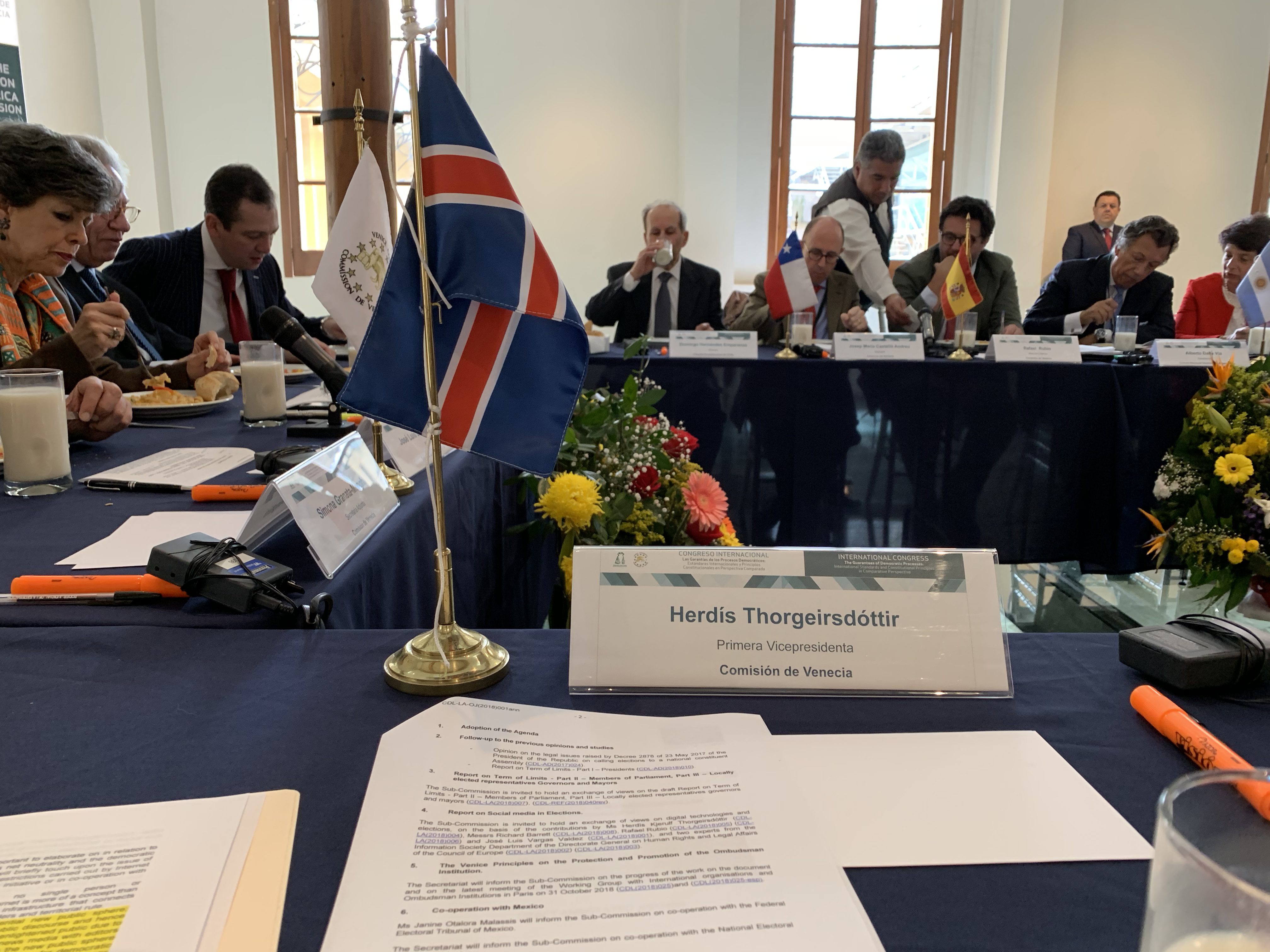
by Herdís Þorgeirsdóttir | 29.11.2018 | Almanak

 Flutti fyrirlestur á alþjóðlegri ráðstefnu í Mexíkó hinn 29. nóvember 2018 á vegum kosningadómstóls landsins (Federal Electoral Tribunal) um þátttöku kvenna í stjórnmálum.
Flutti fyrirlestur á alþjóðlegri ráðstefnu í Mexíkó hinn 29. nóvember 2018 á vegum kosningadómstóls landsins (Federal Electoral Tribunal) um þátttöku kvenna í stjórnmálum.

by Herdís Þorgeirsdóttir | 22.11.2018 | Almanak

Skemmtileg tilviljun að tvær íslenskar konur, Ingibjörg Sólrún Gísladóttir og Herdís Þorgeirsdóttir voru meðal aðal fyrirlesara á ráðstefnunni. Hér á mynd ásamt Grétu Gunnarsdóttur sendiherra sem starfar með Ingibjörgu í Varsjá.
Í tilefni af 70 ára afmæli Mannréttindayfirlýsingar Sameinuðu þjóðanna, fyrstu alþjóðlegu stefnuyfirlýsingarinnar sem samþykkt var á Allsherjarþingi Sameinuðu þjóðanna hinn 10. desember 1948 var haldin alþjóðleg ráðstefna í Samarkand í Uzbekistan í mið-Asíu 22.-23. nóvember 2018 og sú fyrsta sinnar tegundar. Ráðstefnuna sóttu m.a. varaframkvæmdastjóri Sameinuðu þjóðanna og fleiri fulltrúar alþjóðlegra stofnana. Svo skemmtilega vildi til að tveir aðal fyrirlesarar í sama panel voru þær Ingibjörg Sólrún Gísladóttir forstjóri Mannréttindastofnunar OSCE í Varsjá og Herdís Þorgeirsdóttir fyrsti varaforseti Feneyjanefndar Evrópuráðsins.
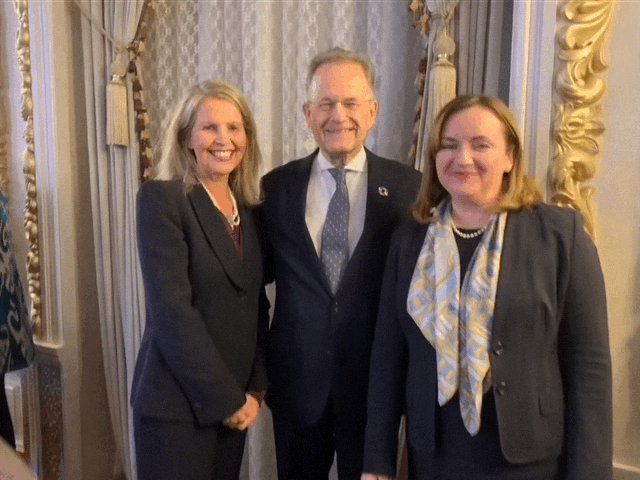
Með Michael Möller öðrum æðsta yfirmanni Sameinuðu þjóðanna og Nataliu Gherman, fulltrúa framkvæmdastjóra SÞ í mið-Asíu.
Mannréttindayfirlýsing S.Þ. markaði ákveðin tímamót og varð grunnur að Mannréttindasáttmála Evrópu og Samningi SÞ um stjórnmálaleg og borgaraleg réttindi. Eleanor Roosevelt sem var einn af aðalhvatamönnum þess að að útbúa yfirlýsinguna kallaði hana Magna Carta alls mannkynst. Mannréttindayfirlýsingin er ekki lagalega bindandi en hefur öðlast fastan sess í hinu alþjóðlega réttarkerfi um hvað séu eðlileg viðmið í vernd mannréttinda.
Frumkvæði að því að halda ráðstefnuna í hinni fornu og fögru borg Samarkand átti forseti Uzbekistan, Shavkat Mirziyoyev á allsherjarþingi SÞ fyrir ári síðan. Þannig vilja Uzbekar marka sér stöðu sem leiðandi á sviði mannréttinda í mið-Asíu.
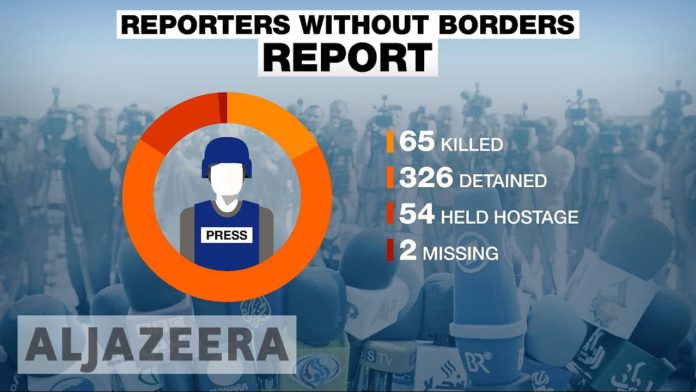
by Herdís Þorgeirsdóttir | 19.11.2018 | Almanak

Frétt á vef RUV vegna viðtals Óðins Jónssonar við Herdísi Kjerulf Þorgeirdóttur hinn 19. nóvember 2011 (
hlusta hér) : Blaðamennska er oft vanþakklátt starf – jafnvel stórhættulegt. Það sem af er þessu ári hafa 45 blaðamenn í heiminum verið drepnir, sumir við skyldustörf á háskaslóð, aðrir hafa verið myrtir. Fyrir rúmu ári var Daphne Caruana Galizia, blaðamaður, myrt – sprengju komið fyrir undir bíl hennar. Þetta var 16.október 2017. Enn hefur réttlætinu ekki verið fullnægt og maltnesk yfirvöld sæta ámæli vegna seinagangs við rannsókn málsins. Staðan á Möltu er um margt lýsandi fyrir heiminn.
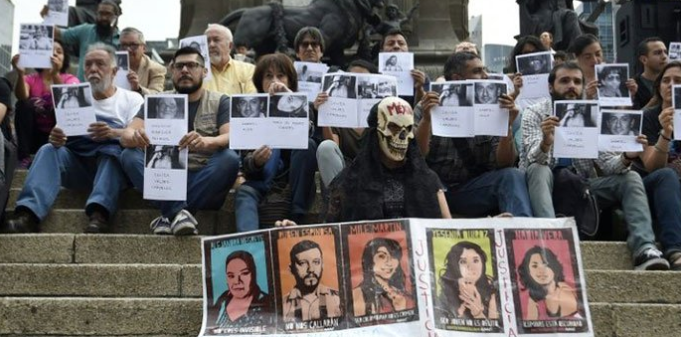 Herdís Kjerúlf Þorgeirsdóttir, lögmaður, fyrsti varaforseti Feneyjanefndar Evrópuráðsins, er nýkomin frá Möltu og ræddi á Morgunvaktinni á Rás 1 um stöðu blaðamanna gagnvart ógnum sem að þeim steðja. Herdís sagði að rannsóknin á Möltu stæði enn og hún hefði séð að íbúar í Valletta, höfuðborg Möltu, sýndu minningu hennar virðingu og segðu: „Þetta má ekki gleymast. Þetta má ekki fyrnast. Við verðum að halda vöku okkar.” Rithöfundurinn heimsþekkti Margaret Atwood ritaði á dögunum grein fyrir hönd PEN-samtakanna í The Guardian og spurði hvar réttlætið væri fyrir Daphne Caruana Galizia, sem barðist gegn spillingu í heimalandi sínu, litlu eyríki þar sem frændhygli og óheilbrigt samband stjórnmála og viðskipta hefur verið áberandi. Þetta er staðan víða um heim. „Það er spilling innan stjórnmálanna. Það er spilling í viðskiptalífinu. Alltof náin tengsl fjármálaafla og stjórnmála út um allan heim – í flestum ríkjum.”
Herdís Kjerúlf Þorgeirsdóttir, lögmaður, fyrsti varaforseti Feneyjanefndar Evrópuráðsins, er nýkomin frá Möltu og ræddi á Morgunvaktinni á Rás 1 um stöðu blaðamanna gagnvart ógnum sem að þeim steðja. Herdís sagði að rannsóknin á Möltu stæði enn og hún hefði séð að íbúar í Valletta, höfuðborg Möltu, sýndu minningu hennar virðingu og segðu: „Þetta má ekki gleymast. Þetta má ekki fyrnast. Við verðum að halda vöku okkar.” Rithöfundurinn heimsþekkti Margaret Atwood ritaði á dögunum grein fyrir hönd PEN-samtakanna í The Guardian og spurði hvar réttlætið væri fyrir Daphne Caruana Galizia, sem barðist gegn spillingu í heimalandi sínu, litlu eyríki þar sem frændhygli og óheilbrigt samband stjórnmála og viðskipta hefur verið áberandi. Þetta er staðan víða um heim. „Það er spilling innan stjórnmálanna. Það er spilling í viðskiptalífinu. Alltof náin tengsl fjármálaafla og stjórnmála út um allan heim – í flestum ríkjum.”
„Ástandið núna er virkilega svart,” sagði Herdís Kjerúlf Þorgeirsdóttir á Morgunvaktinni, ekki síst í Mexíkó og víða í S-Ameríku: „Fólk er ofboðslega hrætt vegna þess að hættan við að tjá sig, andæfa og segja hluti, getur endað með lífláti – morði.”
http://www.ruv.is/frett/astandid-er-nuna-er-virkilega-svart?fbclid=IwAR1bxzoSHBhj4UebijBme2QSbli2eip_e4lIlVQnOrFXHmhAcKHKs_YAkAA
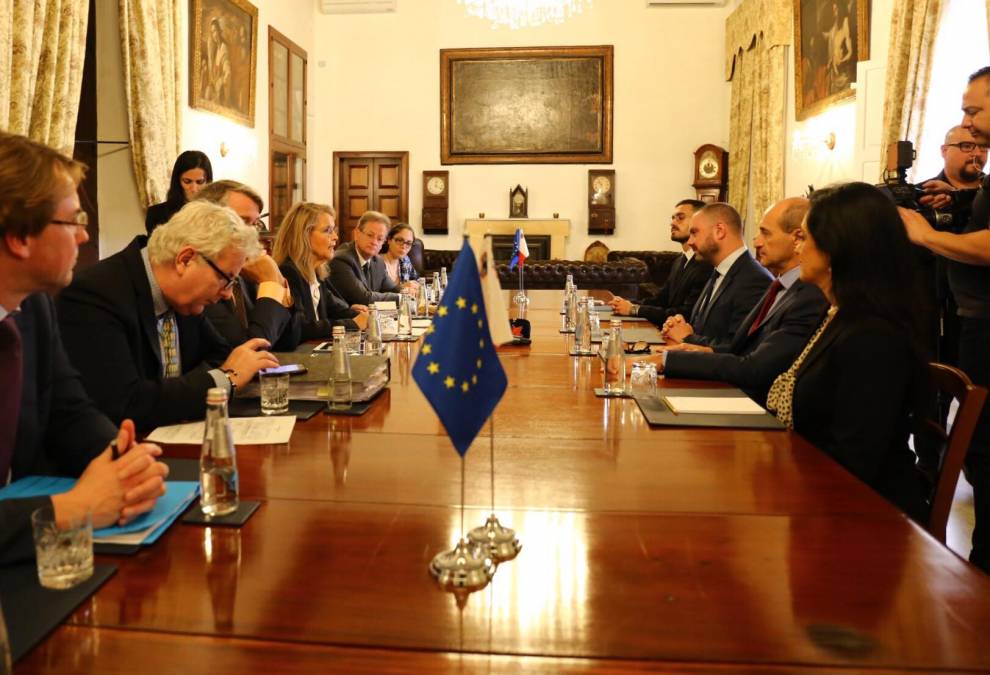
by Herdís Þorgeirsdóttir | 7.11.2018 | Almanak
 Sendinefnd frá Feneyjanefnd Evrópuráðsins átti fundi með stjórnvöldum á Möltu sem leituðu til nefndarinnar um aðstoð við að styrkja stjórnskipun landsins, þ. á m frekari aðgreiningu ríkisvalds, sjálfstæði dómsstóla og réttarríkið almennt. Sama beiðni hafði áður komið frá laganefnd Evrópuráðsþingsins. Beiðnin kemur í kjölfar hryllilegs morðs á þekktri blaðakonu, Daphne Caruana Galizia í nóvember 2017 en hún hafði gagnrýnt stjórnvöld harkalega fyrir spillingu. Þrír menn voru handteknir eftir að sprengju hafði verið komið fyrir í bifreið með þeim afleiðingum að hún lét lífið. Malta hefur verið aðili að Evrópuráðinu frá 1965 og er einnig í Evrópusambandinu. Stjórnvöld hafa sætt harðri gagnrýni í kjölfar morðsins á Daphne en hún hafði sætt hótunum og einelti fyrir morðið og hafði láti lögreglu vita um morðhótanir.
Sendinefnd frá Feneyjanefnd Evrópuráðsins átti fundi með stjórnvöldum á Möltu sem leituðu til nefndarinnar um aðstoð við að styrkja stjórnskipun landsins, þ. á m frekari aðgreiningu ríkisvalds, sjálfstæði dómsstóla og réttarríkið almennt. Sama beiðni hafði áður komið frá laganefnd Evrópuráðsþingsins. Beiðnin kemur í kjölfar hryllilegs morðs á þekktri blaðakonu, Daphne Caruana Galizia í nóvember 2017 en hún hafði gagnrýnt stjórnvöld harkalega fyrir spillingu. Þrír menn voru handteknir eftir að sprengju hafði verið komið fyrir í bifreið með þeim afleiðingum að hún lét lífið. Malta hefur verið aðili að Evrópuráðinu frá 1965 og er einnig í Evrópusambandinu. Stjórnvöld hafa sætt harðri gagnrýni í kjölfar morðsins á Daphne en hún hafði sætt hótunum og einelti fyrir morðið og hafði láti lögreglu vita um morðhótanir.
Feneyjanefnd átti fundi á Möltu með dómsmálaráðherra og vara forsætisráðherra, forseta æðsta dómsstóls landsins, ríkislögmanni, umboðsmanni, forseta Möltu, félagasamtökum, lögregluyfirvöldum og fleirum.
http://uploads.maltatoday.com.mt/news/national/90718/specific_constitutional_changes_to_address_corruption_needed_opposition_tells_venice_commission?fbclid=IwAR0yIrSlAmMEKSqtCBXw8Ac73e9dPJszM5KoWYPgQgFlQ56h3sSfRDNyEW4#.W-WAKXr7SRt
http://www.independent.com.mt/articles/2018-11-06/local-news/Government-Nationalist-Party-meet-with-Venice-Commission-6736198929?fbclid=IwAR04JefYzcQa4rPkEElu4byJ0RkI-RCtpVIhhz68wZySp3-2XKcOoFUNUcE
Talks between Government and the Venice Commission on strengthening the country’s institutions
Il-Venice Commission titlob laqgħa ma’ Chris Fearne











